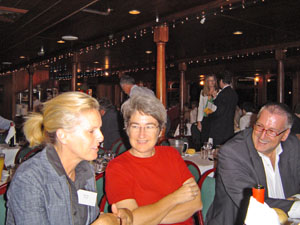 On the Riverboat:
On the Riverboat:
Liz Ferrier, Sal Humphreys, and Terry CutlerAfter last night's riverboat excursion, the second day at the Open Content Licencing conference has begun now, with a panel chaired by my colleague Stuart Cunningham from CIRAC. The session will deal with the role of open content licencing in government and public institutions. Stuart begins by noting the shift of cultural production from traditional producers to what used to be consumers and are now users (or, in the terminology I've used in my book, produsers). Stuart notes that this shift has various implications for governmental IP regimes and governments' overall engagement with citizens.
The first speaker of the panel is Terry Cutler, advisor to various governments in Australia and elsewhere and a board member of various significant Australian arts and media organisations. He suggests that there has been an abnegation of public policy leadership in this area, instead preferring to let other players pick up the reins. There is a systemic failure of government policy in the field of knowledge management and innovation - in intellectual property law and copyright, in competition policy and competition law, and in the identification of parallels between IP issues and other fields (which may help to think outside the box in identifying possible solutions). So why does knowledge deprivation occur in a class of intellectual capital?
Another problem area is related to policy distortions - so, for example, success in innovation is often measured in patents and successful spin-off companies, not, for example, by the diffusion of innovation throughout the population. But the more rapid the diffusion and take-up, the more rapid the effects of technology and know-how. Again, there is an abnegation of public policy leadership here, and most of the interesting initiatives (like the Creative Commons) now tend to come from non-governmental organisations. Major technology companies are now beginning to take note of such developments, and are flirting with open innovation models (in spite of the great anti-heroes like Microsoft, RIAA and MPAA) - yet governments have not yet begun to pay enough attention yet.
Finally, government's administration of its own public assets is also problematic in the IP area. The impact of IP regimes on collaborative and interdisciplinary research has not been recognised, and the role of public cultural institutions (museums, galleries, libraries, etc.) in the innovation system has not been appreciated (and therefore not funded). Public cultural institutions also have a role as open content repositories, yet this role is not sufficiently supported. And finally government in Australia also has not yet addressed the issue of crown copyright - i.e. IP assets developed or controlled by government: putting these back into the public hands may make a significant contribution to innovation and development by local institutions. In no democratic society would we let people starve to death, but the same energy isn't put into combatting intellectual and creative starvation.
IP lawyers Anne Fitzgerald and Neale Hooper are up next, discussing the Queensland State Government policy developments in this area which they are working on. The Copyright Law Review Inquiry has been doing a lot of work in this area, examining the role of copyright in government processes. Government holds crown copyright in all intellectual property developed by or under direction of the state (this also includes the work of external contractors). There is a need to free up some of this material, broadening fair use provisions or dropping copyright claims altogether.
As the largest unified body in many Australian states government policy on IP has some very significant implications for IP issues in general, and the way content is handled in other, public as well as private institutions. Open licencing is worthy of very close consideration in this respect, and government actually has a relatively open mind on the issue. Citizen access to government content is a fundamentally important, and (generally) supported aim. However, fully open access to content for citizens would also allow open access by corporations, which may prove detrimental overall - so simply eradicating crown copyright altogether may not be beneficial. (Even in the UK, where crown copyright has already been reformed, it has not been abolished entirely.)
Government is a recipient as well as a creator and custodian of information - so it needs to understand open content licencing regimes with all the terms, conditions, and obligations attached to them. In particular, open content licencing allows government to open up its intellectual property to more users while retaining various rights and being able to set usage restrictions. It affords government a real opportunity to develop more flexible and precise access conditions for different uses and users.
Last up is QUT Deputy Vice-Chancellor Tom Cochrane, discussing the university's response to copyright issues as they have arisen in recent years. For example, QUT as well as many other universities engage significantly in online teaching, which constitutes something of a copyright minefield. Copyright Australia Limited and the Australian Vice-Chancellors' Committee have arrived at a workable solution for administering online learning and teaching environments now, but of course this can be only a start. Importantly, this issue also requires a whole new level of engagement from network administrators even though they have not traditionally been involved with content issues.
Further, in the area of research and research output the issue of intellectual property is also complicated - much research is conducted for certification and recognition rather than for financial remuneration, and yet universities must eventually spend large amounts of money to gain access to published research again (in books, journals, databases). Increasingly, hybrid IP provision models are being developed, however - and Creative Commons approaches can play an important role. CC licences could be applied both to student and staff work, and help clarify the IP status of the content they produce both to themselves and to other potential users of their IP.












